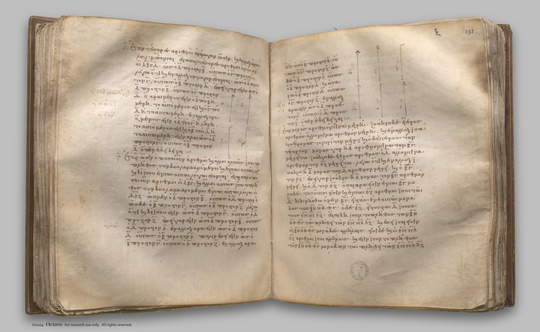index prev next | digilib folio 135

If four numbers be proportional, they will also be proportional alternately.
| Ἐὰν τέσσαρες ἀριθμοὶ ἀνάλογον ὦσιν, καὶ ἐναλλὰξ ἀνάλογον ἔσονται. Ἔστωσαν τέσσαρες ἀριθμοὶ ἀνάλογον οἱ Α, Β, Γ, Δ, ὡς ὁ Α πρὸς τὸν Β, οὕτως ὁ Γ πρὸς τὸν Δ: λέγω, ὅτι καὶ ἐναλλὰξ ἀνάλογον ἔσονται, ὡς ὁ Α πρὸς τὸν Γ, οὕτως ὁ Β πρὸς τὸν Δ. Ἐπεὶ γάρ ἐστιν ὡς ὁ Α πρὸς τὸν Β, οὕτως ὁ Γ πρὸς τὸν Δ, ὃ ἄρα μέρος ἐστὶν ὁ Α τοῦ Β ἢ μέρη, τὸ αὐτὸ μέρος ἐστὶ καὶ ὁ Γ τοῦ Δ ἢ τὰ αὐτὰ μέρη. ἐναλλὰξ ἄρα, ὃ μέρος ἐστὶν ὁ Α τοῦ Γ ἢ μέρη, τὸ αὐτὸ μέρος ἐστὶ καὶ ὁ Β τοῦ Δ ἢ τὰ αὐτὰ μέρη. ἔστιν ἄρα ὡς ὁ Α πρὸς τὸν Γ, οὕτως ὁ Β πρὸς τὸν Δ: ὅπερ ἔδει δεῖξαι. | If four numbers be proportional, they will also be proportional alternately. Let the four numbers A, B, C, D be proportional, so that, as A is to B, so is C to D; I say that they will also be proportional alternately, so that, as A is to C, so will B be to D. For since, as A is to B, so is C to D, therefore, whatever part or parts A is of B, the same part or the same parts is C of D also. [VII. Def. 20] Therefore, alternately, whatever part or parts A is of C, the same part or the same parts is B of D also. [VII. 10] |